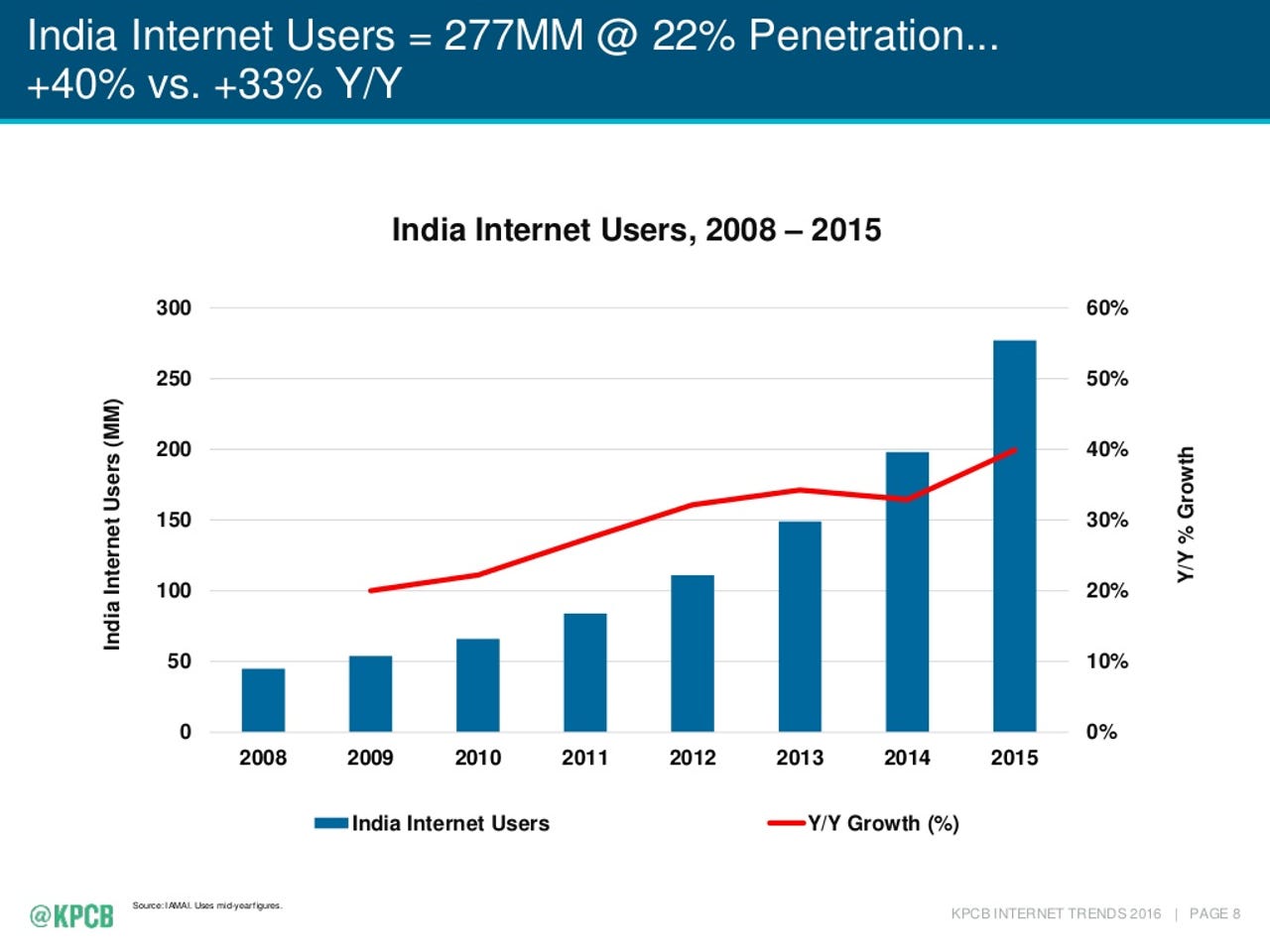Mary Meeker's Internet Trends report: 5 takeaways

Mary Meeker of Kleiner Perkins Caufield & Byers released her annual Internet Trends report on Wednesday, a comprehensive and insightful look at the state of the Internet, the trends that led to the current digital environment and where the trends will take us.
There's a lot to digest in the 213-slide presentation, but here are five major takeaways:
India is keeping internet growth steady
The rate of global internet adoption has fallen flat at 9 percent, with India propelling the continued growth. India's growth rate accelerated year-over-year from 33 percent to 40 percent.
There are now 3 billion internet users worldwide -- that's 42 percent of the world's population. At 277 million users, India is now the second biggest internet market behind China, surpassing the U.S.

The hardest markets to penetrate include countries like Ethiopia, Nigeria and Pakistan, where the offline populations are young, rural and have low literacy rates. In 2014, there was just 18 percent internet penetration in these countries. With a slowing global economy, it's hard to predict whether macro economic factors that have driven internet adoption before will continue to do so, the report notes.
Messaging apps as a commercial gateway
Messaging leaders like Whatsapp, Facebook Messenger and WeChat continue to see strong user growth, and not just for simple, social conversations. Instead, leading messaging services are being deployed more frequently for business-related purposes.
Asia-based messaging services have taken the lead here, with WeChat, Line and KakaoTalk all introducing banking or financial services in the past year. WeChat also introduced enterprise services earlier this year. In Thailand, customers interested in retail purchases will find items they like on Instagram and transition to Line to make the purchase.
Ultimately, messaging leaders will replace mobile home screens as a portal to the Internet
The future of search is speech-based
Voice interfaces will continue to become more popular, thanks to the recent improvements in speech recognition accuracy.
The report quotes Baidu chief scientist Andrew Ng: "Most people underestimate the difference between 95 percent and 99 percent accuracy -- 99 percent is a game changer."
As Adrian Kingsley-Hughes writes, that effectively means that, thanks to its Echo devices, the future belongs to Amazon, not Apple.
The U.S. could lead the transformation of the auto industry
Cars represent a new paradigm in computer-human interaction, giving tech companies like Google and Tesla the opportunity to revive the American auto industry and transform transportation.
The United States could benefit if the regulatory framework allows for more innovation, Meeker says. For instance, regulators should work with -- not against -- car-sharing companies like Uber, while manufacturers need to maintain high cybersecurity standards.
In the future, Meeker's presentation suggests, car ownership could be less prevalent, but the miles logged on self-driving vehicles could surpass current levels.
Privacy concerns abound as data accumulates
The amount of data in the digital universe continues to grow as storage costs fall. Opportunities abound to leverage that data to improve people's lives and help enterprises run more efficiently
At the same time, privacy concerns hound those opportunities. The Meeker report cites a study from the National Cyber Security Alliance found that 74 percent of Americans have limited their online activity in the last year because of privacy concerns.
The report leaves it as an open ended question as to whether the same privacy laws that apply to the physical world should apply to the digital world.